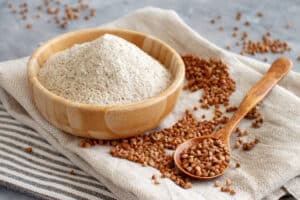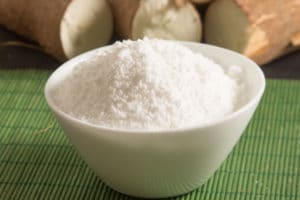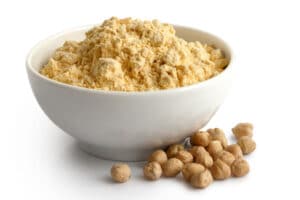Flour significantly raises the caloric content of recipes. A hundred grams of all-purpose white wheat flour — the most common type of flour used in recipes — has 364 calories.
Although there are many low-calorie substitutes for eggs, butter, and sugar, we often struggle to find a low-calorie flour substitute.
While there are many different kinds of flour, most of them are as caloric as white flour, if not more. We have 14 flours with lower calorie counts, but the difference isn’t huge for the most part.
Also, you can’t simply swap out all-purpose flour with a substitute and expect to get the same results when you’re baking and cooking. Different flours have different properties and are more suitable for certain recipes than others.
In this article, we will help you sort out all flour-related ambiguities so you can bake treats for your loved ones with the best low-calorie alternatives.
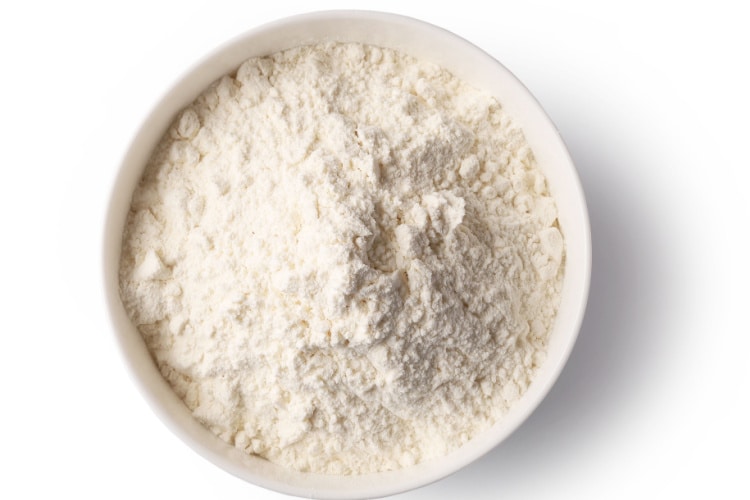
Low-Calorie Flour Alternatives
- Bread flour
- Corn flour
- Sorghum flour
- Arrowroot flour
- Potato flour
- Semolina flour
- Self-raising flour
- Rye flour
- Barley flour
- Kamut flour
- Whole-wheat flour
- Peanut flour
- Sunflower seed flour
- Lupin flour
Bread Flour
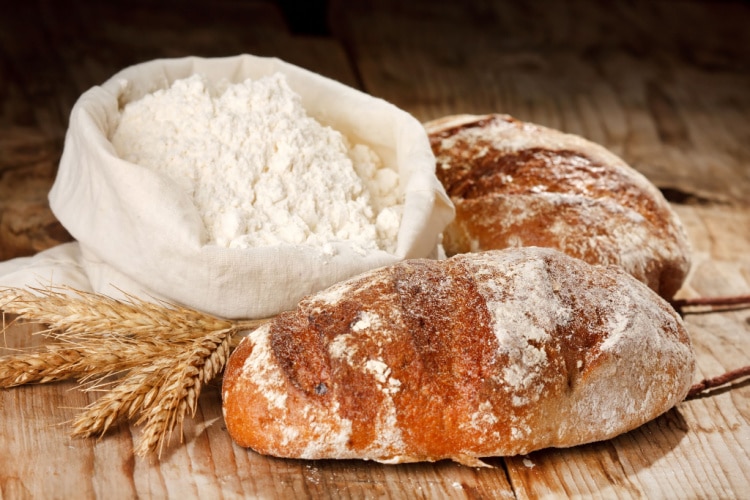
Bread flour is lower in calories than all-purpose flour. It’s used to make rich and delicious yeast bread.
It’s rich in gluten — the primary element that gives bread dough flexibility and elasticity, as well as its distinctive crunch.
You can substitute all-purpose flour with bread flour when you want a chewier result, such as pizza dough. However, don’t use it for baked items that are supposed to be fluffy and soft.
Corn Flour
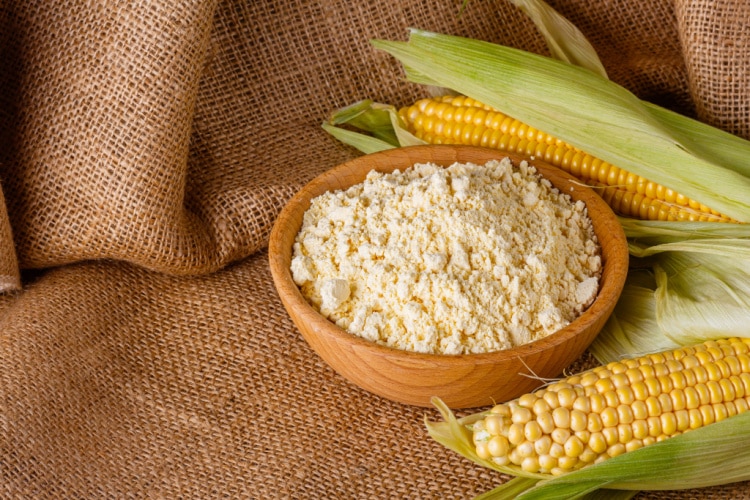
Corn flour is a great low-calorie replacement. It’s a gluten-free flour — so people with allergies and gluten intolerance can consume it.
However, If you use corn flour in your cakes and baked products, the dough will not rise as much.
Furthermore, corn flour produces a thick batter even when you use a little. When swapped for all-purpose flour, use half a cup of corn flour for every cup of all-purpose flour to achieve the ideal thickness.
Sorghum Flour
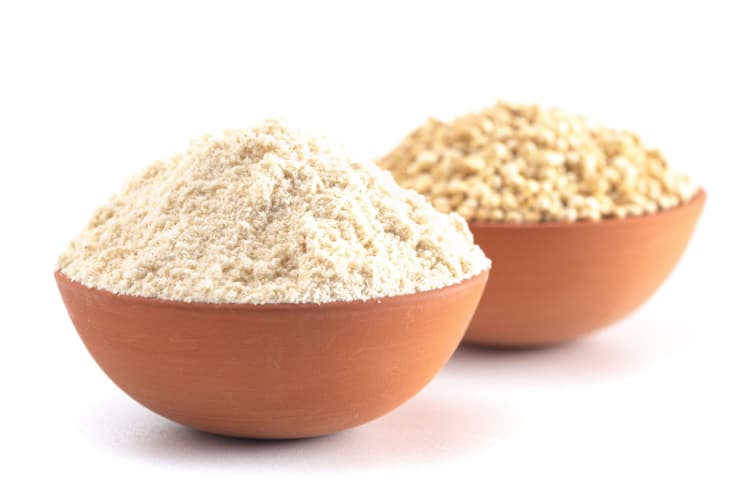
Sorghum flour is well-known in gluten-free and low-calorie baking due to its adaptability and similarity to all-purpose flour.
Sorghum adds structure and firmness to baked goods, improving their texture. It produces a nice, crunchy coating in fried foods and baked dishes.
Keep in mind that sorghum flour might give your baked items a sour taste. Most bakers suggest using sorghum flour in combination with other flour — like potato starch or sweet rice flour.
Arrowroot flour
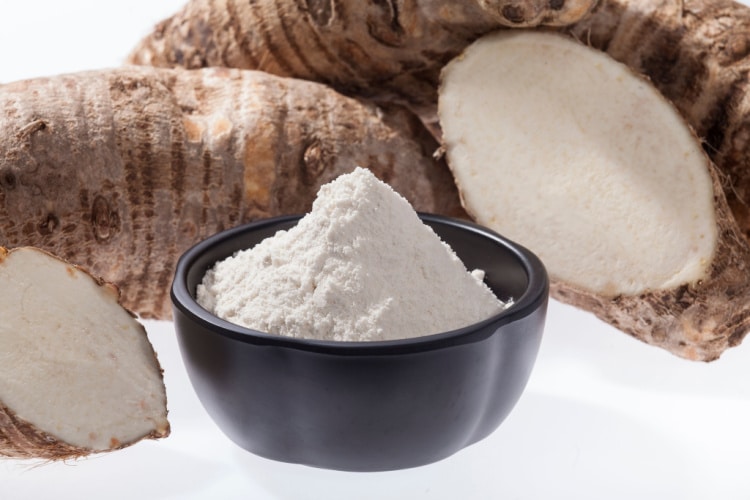
A high-quality arrowroot flour or powder will only include arrowroot starch and is naturally gluten-free.
It’s rich in carbs and low on calories, proteins, and fat. It’s added to the batter to increase moisture, thicken the texture, and bond the ingredients together.
Arrowroot flour may be used to thicken savory dishes like chili sauces and spaghetti sauce, as well as a low-calorie flour substitute for puddings, cakes, and muffins.
But remember — you must first make a slurry with the flour before using it to thicken spicy sauces, soups, etc. Otherwise, the arrowroot basically turns into a giant ball of jelly when you add it to the heated ingredients.
Potato Flour
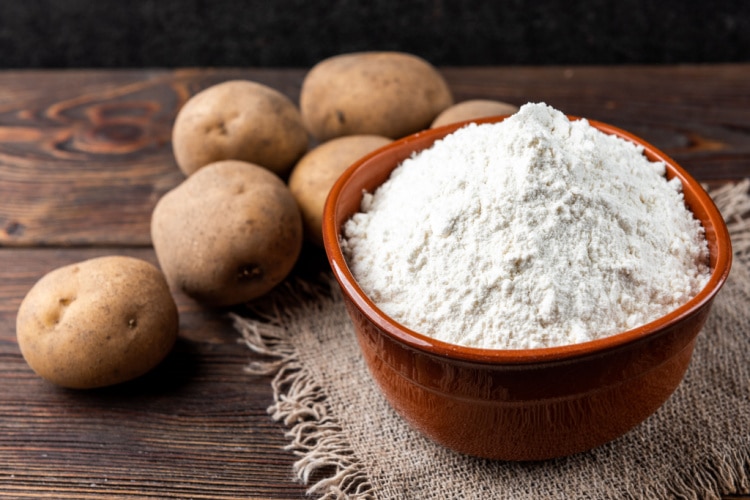
To make delicious, potato-flavored bread with a long shelf life, consider using potato flour. It’s a gluten-free alternative made from dried potato skins.
Potato flour is similar to potato starch, but they aren’t the same. Potato flour is formed from the entire dried potato, and starch is made from the starch collected from smashed potatoes.
Potato flour increases the moisture content of baked goods because it attracts and holds onto water. You can add a small amount to gluten-free baked goods to soften the crumb.
When combined with all-purpose, bread, or whole wheat flour, it makes yeast dough simpler to shape and maneuver. It’s also used to thicken soups and stews.
Semolina Flour
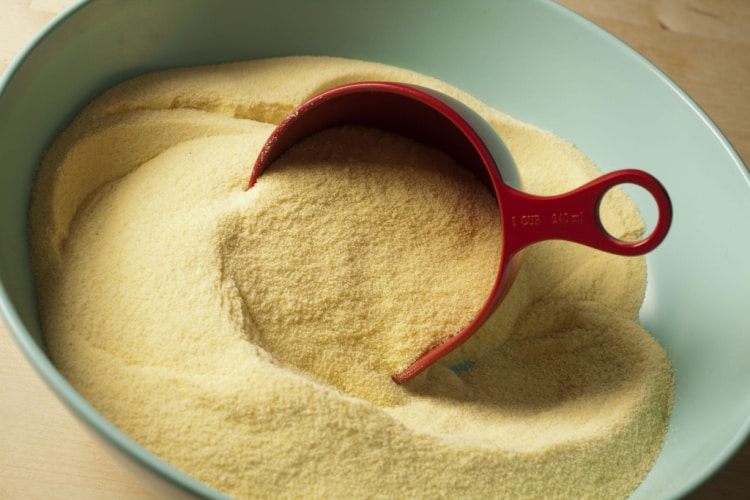
Semolina is a type of low-calorie durum wheat flour. It’s coarser, darker, and more yellowish in color, with a more earthy aroma than ordinary flour.
Semolina is most frequently used in Italy, where it’s known as pasta or macaroni wheat since it’s primarily used to make pasta or couscous. Semolina has a lot of gluten, which helps pasta hold its shape better.
Apart from pasta and couscous, semolina is also used in delicious puddings, cakes, and pies and can make a good bread crust.
Self-Raising Flour
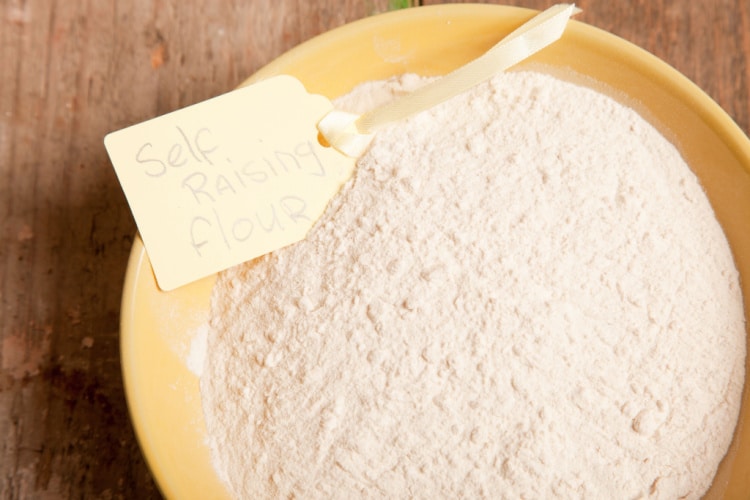
If you are aiming for super-voluminous baked goods, then self-raising flour is a great low-calorie option. It was invented In the late 1800s by the English baker Henry Jones to improve the taste and texture of baked items during lengthy sea trips.
It’s a mixture of all-purpose flour, baking powder, and salt — and this combo enables baked goods to rise.
This flour is perfect for pancakes, muffins, or cookies because it has less gluten than all-purpose flour, resulting in a softer product.
If a recipe asks for 1 cup of all-purpose flour and 1 tsp baking powder, you may use 1 cup of self-rising flour.
With this option, you should cut down on the salt you use in your recipe because there is approximately ¼ tsp of salt in every cup of self-rising flour.
Rye Flour
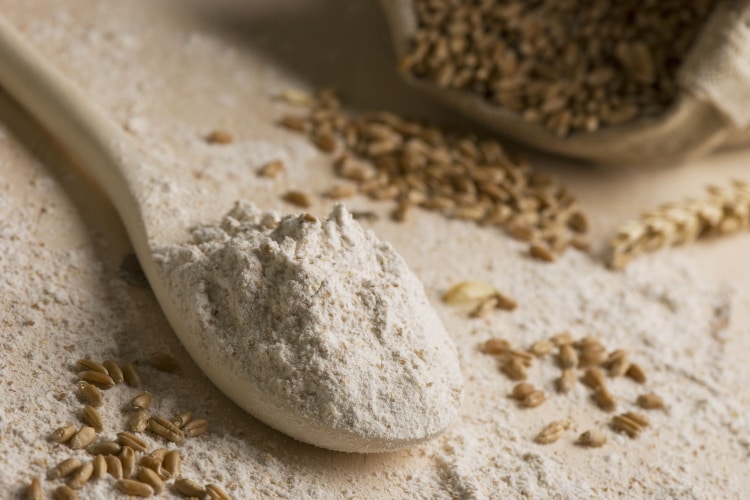
Rye flour is produced from ground rye berries, sometimes called whole rye kernels. It imparts a tangy, nutty taste to baked goods.
Since it doesn’t have much gluten, baked goods produced with this flour may not rise as well as they should.
Bread batter prepared with rye flour is often thicker and it’s more difficult to form dough with it. However, it’s ideal for cookies, biscuits, or anything that needs to be soft rather than chewy.
Rye flour can hold a lot of moisture for long periods. That’s why baked items produced using rye flour will last longer than those made with all-purpose flour.
Barley Flour
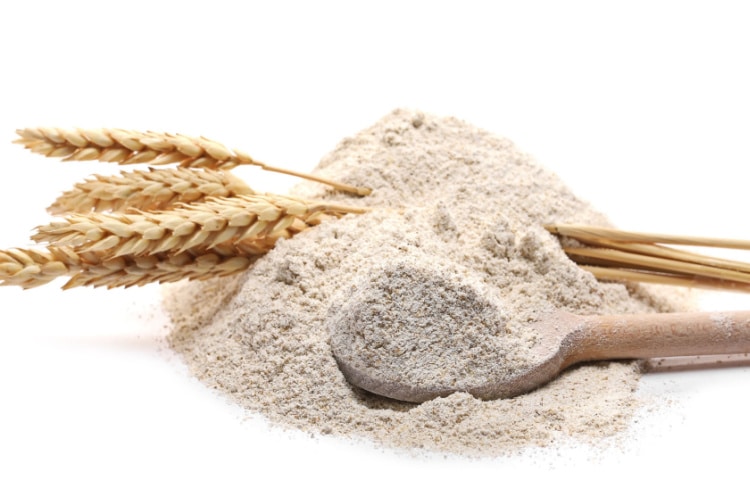
Barley flour is a healthy non-wheat flour derived from the barley plant. It has a moderate but somewhat nutty flavor.
It’s low in gluten, so it can soften baked foods while still allowing the dough to rise. It’s often used to make barley bread, which is crunchier and more flavorful than white bread.
While all-purpose flour muffins are dry and crumbly, barley flour muffins are more moist and soft but less solid and prone to breakage.
Kamut Flour
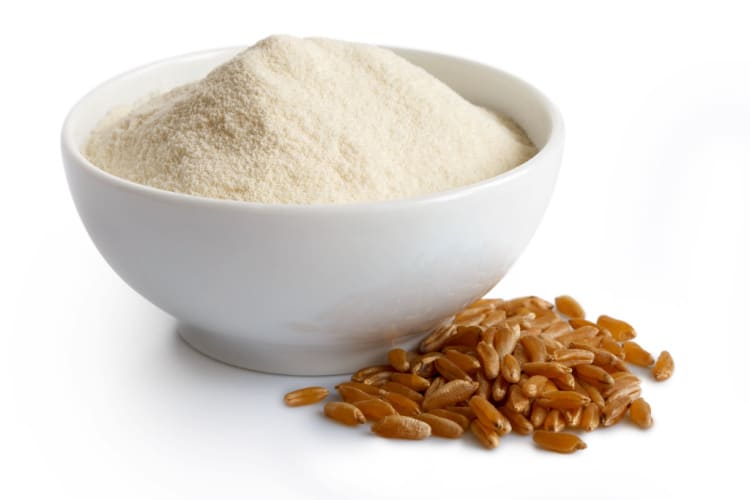
This ancient grain is a wheat cultivar known for its smooth, buttery, nutty flavor and high protein, low-calorie content.
It adds a wonderful butter and almond taste to bread, cookies, crackers, pastries, muffins, and pancakes.
If you wish to use it in baking or cooking, use ¾ cup of Kamut flour for 1 cup of all-purpose flour.
The wheat grains themselves can also be soaked and used in salads. Kamut flour is also used to produce excellent pasta.
Whole-Wheat Flour
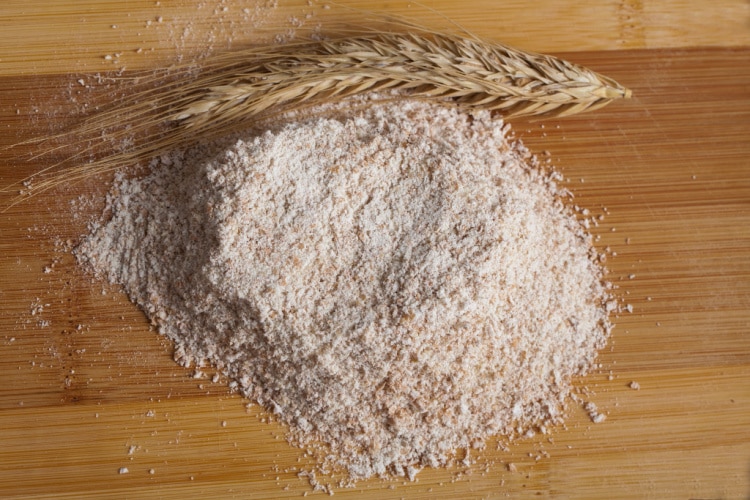
Whole wheat flour is created by grinding the entire wheat kernel. Since it contains the bran and germ of the wheat kernel, it results in a flour that is somewhat darker in color, with a robust nutty flavor and a high nutritional value.
Because of bran and germ, whole wheat flour produces less gluten development and elasticity than all-purpose flour. As a result, whole wheat bread has a denser, less airy structure.
Whole wheat flour allows other ingredients to shine through, so combining it with nuts and fruits in your baked goods is a good idea.
Peanut Flour
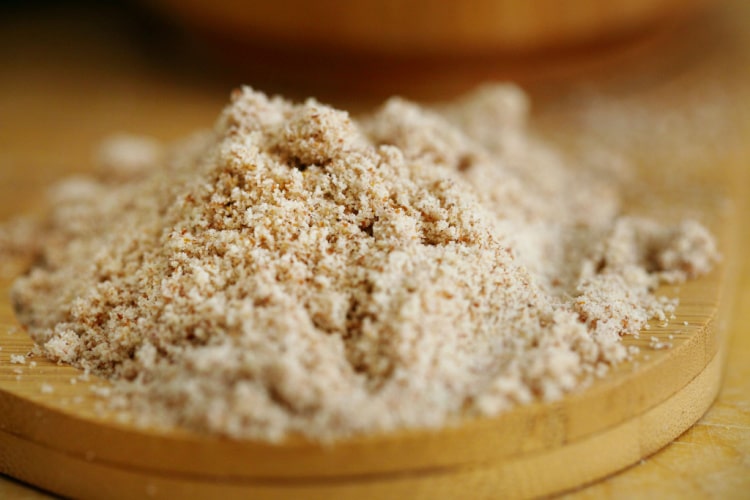
Peanut flour is a fantastic low-calorie alternative to all-purpose flour. It’s low in calories, gluten-free, and protein-rich.
This flour is made using a straightforward procedure that involves grinding peanuts into a paste, pressing the oil out, and then drying or roasting the residual paste.
This is legume flour, so it will slightly change the flavor of your dish — still, peanut-flavored baked goods don’t seem so bad, right?
The fine texture of peanut flour makes it ideal for baking fluffy baked items. It maintains the same texture as ordinary flour and won’t make your baked goods heavy or dense. It may be substituted with other types of flour in a one-to-one ratio.
Sunflower Seed Flour
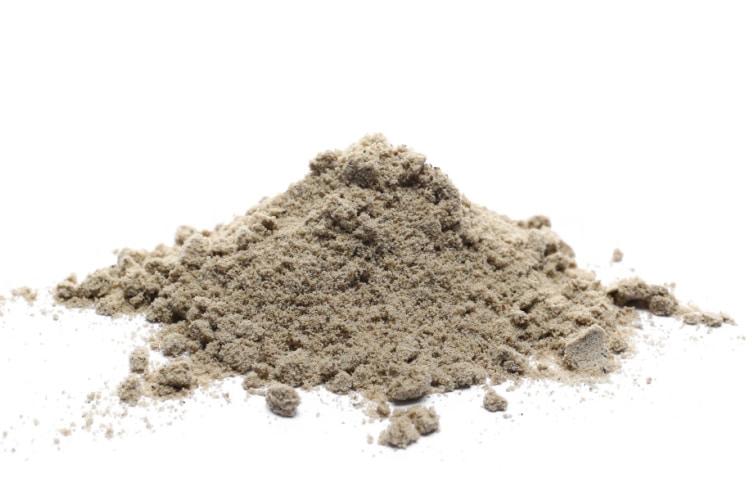
Sunflower seed flour is made by crushing sunflower seeds till they’re fine and powdery.
The flavor of sunflower seed flour is delicate, nutty, and sweet. Because the flavor is so subtle, it won’t overpower other flavors in a dish.
It adds little weight to baked goods and produces a very silky and moist batter. It works well in both sweet and savory meals. Sweet dishes emphasize the sweetness of sunflower flour, whilst savory ones emphasize its nuttiness.
It can be used in place of all-purpose flour at a 1:1 ratio.
Lupin Flour
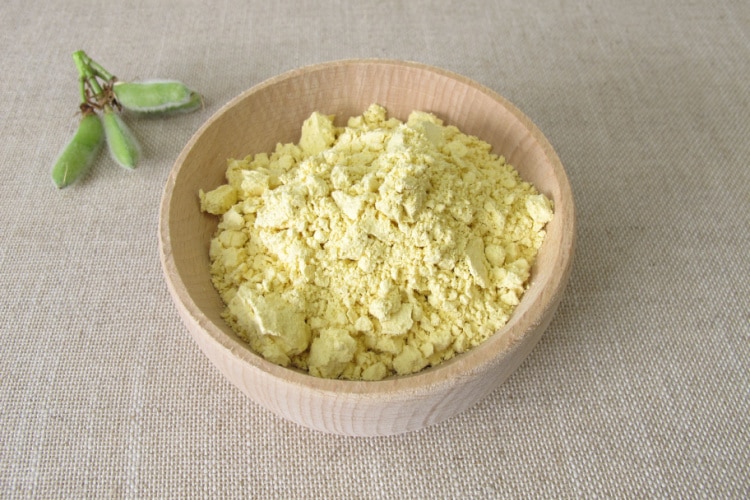
Introducing lupin flour, the flour with the fewest calories. Yes, we saved the finest for last.
Lupin flour is made from lupin beans and has very few calories, although it’s high in protein and low in carbs.
It has a bland, somewhat starchy flavor. Since it’s light, fluffy, and non-dense, it’s an excellent alternative to wheat flour in baking.
Although lupin may be used alone, it works best when combined with other flours. It’s gluten-free and easily digestible.
Low-Calorie Flour Substitutes: Nutritional Content
| Nutritional Value per 100g | Calories | Carbs | Fiber | Fat | Protein |
|---|---|---|---|---|---|
| All-purpose white flour | 364 | 76g | 2.7g | 1g | 10g |
| Bread flour | 361 | 72.5g | 2.4g | 1.7g | 12g |
| Corn flour | 361 | 76.8g | 7.3g | 3.9 g | 6.9 g |
| Sorghum flour | 359 | 76.6g | 6.6g | 3.3g | 8.4 g |
| Arrowroot flour | 357 | 88.2g | 3.4g | 0.1g | 0.3g |
| Potato flour | 357 | 83.1g | 5.9g | 0.34g | 6.9g |
| Semolina flour | 357 | 73.8g | 4.8g | 1.2g | 11.9g |
| Self-raising flour | 353 | 83.6g | 4g | 1.5g | 8.9g |
| Rye flour | 349 | 75.4g | 11.8g | 1.5g | 10.9g |
| Barley flour | 345 | 74.5g | 10.1g | 1.6g | 10.5g |
| Kamut flour | 337 | 70.6g | 11.1g | 2.1g | 14.5g |
| Whole-wheat flour | 332 | 74.5g | 13.1g | 2g | 9.6g |
| Peanut flour | 327 | 31.3g | 15.8g | 21.9g | 33.8g |
| Sunflower seed flour | 326 | 35.8g | 5.2g | 1.7g | 48.1g |
| Lupin flour | 247 | 40g | 36.7g | 6.7g | 40g |
Conclusion
The victor of our low-calorie flour substitute comparison is lupin flour, which has an incredible 247 calories per 100g.
It’s not just minimal in calories but also one of the least carb-heavy options. It has a high fiber content as well. Overall, it’s a super-flour, especially if you’re on a carb-limited diet.
Other options that are closer to all-purpose flour in terms of calories, but have other benefits are peanut, potato, arrowroot, corn, and sorghum flour – they’re all gluten-free.
Bread flour is great for pizza crust, whereas semolina is perfect for making pasta dough.
Rye, barley, and wholewheat flour are excellent for baking healthy and nutritious bread. Sunflower seed flour is both low in calories and has an exceptional protein value.
Finally, you can always use self-rising flour as a practical shortcut.
Further reading: Baking powder vs. cream of tartar



